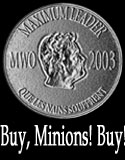Drudge links to a Guardian article about a soon-to-air, 3-part BBC series called “The Power of Nightmares,” produced by Adam Curtis. The series argues that the war on terror (surrounded by scare quotes in the article) is founded on a myth. To wit:
…the central theme of The Power of Nightmares is riskily counter-intuitive and provocative. Much of the currently perceived threat from international terrorism, the series argues, “is a fantasy that has been exaggerated and distorted by politicians. It is a dark illusion that has spread unquestioned through governments around the world, the security services, and the international media.” The series’ explanation for this is even bolder: “In an age when all the grand ideas have lost credibility, fear of a phantom enemy is all the politicians have left to maintain their power.”
I think there may be something to the idea that politicians have exploited and will continue to exploit the terror threat to their advantage. But I also think that, if the Guardian article is correct about Curtis’s thesis, Curtis is willfully overlooking– or underplaying– the obvious evidence of nearly 3000 dead Americans.
Here, apparently, is the series’ take on al-Qaeda:
The Power of Nightmares seeks to overturn much of what is widely believed about Osama bin Laden and al-Qaida. The latter, it argues, is not an organised international network. It does not have members or a leader. It does not have “sleeper cells”. It does not have an overall strategy. In fact, it barely exists at all, except as an idea about cleansing a corrupt world through religious violence.
Curtis’ evidence for these assertions is not easily dismissed. He tells the story of Islamism, or the desire to establish Islam as an unbreakable political framework, as half a century of mostly failed, short-lived revolutions and spectacular but politically ineffective terrorism. Curtis points out that al-Qaida did not even have a name until early 2001, when the American government decided to prosecute Bin Laden in his absence and had to use anti-Mafia laws that required the existence of a named criminal organisation.
Notice the careful wording of the second paragraph. It seems to imply that the American government gave al-Qaeda its name. Is this true? I’ll grant that the paragraph could be interpreted differently, but something tells me this is deliberately manipulative.
The writer of the Guardian article, Andy Beckett, expresses some doubts about Curtis’s thesis:
Yet the notion that “security politics” is the perfect instrument for every ambitious politician from Blunkett to Wolfowitz also has its weaknesses. The fears of the public, in Britain at least, are actually quite erratic: when the opinion pollsters Mori asked people what they felt was the most important political issue, the figure for “defence and foreign affairs” leapt from 2% to 60% after the attacks of September 2001, yet by January 2002 had fallen back almost to its earlier level. And then there are the twin risks that the terrors politicians warn of will either not materialise or will materialise all too brutally, and in both cases the politicians will be blamed. “This is a very rickety platform from which to build up a political career,” says Eyal. He sees the war on terror as a hurried improvisation rather than some grand Straussian strategy: “In democracies, in order to galvanize the public for war, you have to make the enemy bigger, uglier and more menacing.”
I’ll be curious to read the Maximum Leader’s (and his other ministers’) opinion about the article.
_


